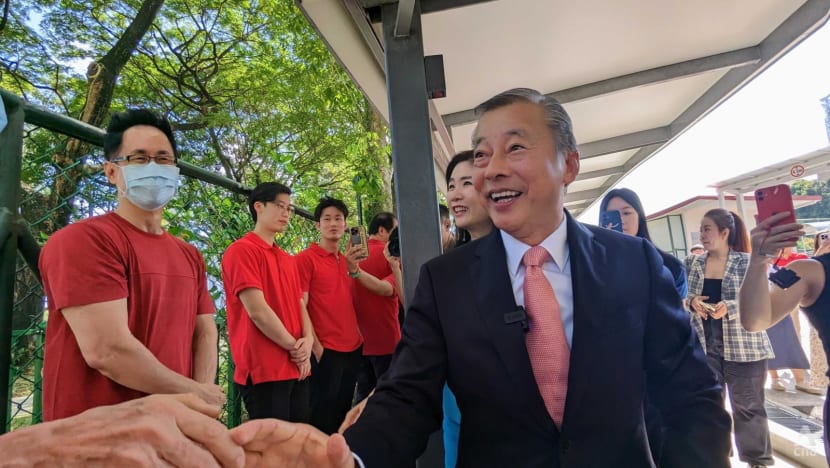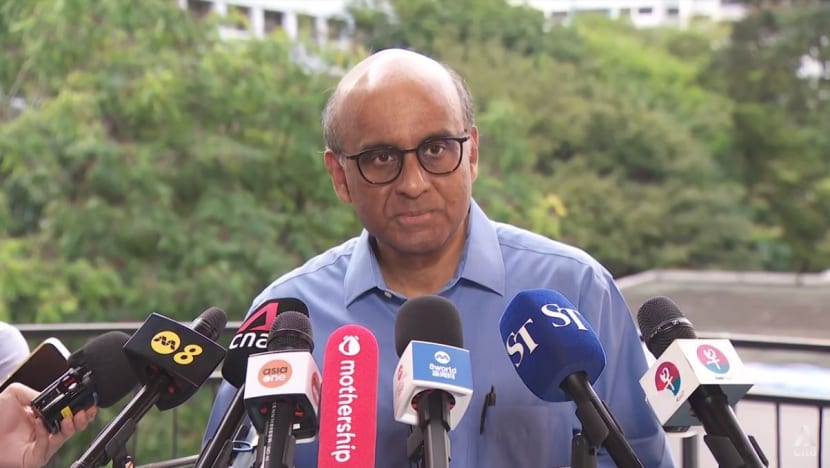
Mr George Goh, founder of Harvey Norman Ossia, greeting supporters outside the elections department in Singapore on Jun 13, 2023. (Photo: CNA/Try Sutrisno Foo)
Unless more than one Certificate of Eligibility is issued, this Presidential Election could still turn out to be a walkover. It would be helpful for businessman George Goh to show voters he meets the private sector requirements soon, says SMU associate professor Eugene K B Tan.

Mr George Goh, founder of Harvey Norman Ossia, greeting supporters outside the elections department in Singapore on Jun 13, 2023. (Photo: CNA/Try Sutrisno Foo)
SINGAPORE: The process for Singapore’s sixth presidential election formally kicked off on Tuesday (Jun 13), with the opening of applications for the Certificate of Eligibility and submission of community declarations.
With Senior Minister Tharman Shanmugaratnam and businessman George Goh indicating their intent to run, there is the tantalising prospect of voters heading to the polls later this year.
Much has been said about Mr Tharman’s stature potentially deterring others from standing against him and how yet another uncontested election might erode the credibility of the elected presidency. On his part, Mr Tharman said on Sunday that having to contest the election was “important for (him)”.
It is precisely given his ties to the ruling People’s Action Party (PAP), notwithstanding his credentials, that Mr Tharman’s presidential bid could inspire hopefuls, especially from the private sector, who believe that they are equal to the task of being president.
In particular, those who seek to portray themselves as the non-establishment option, as Mr Goh has, will be looking to appeal to some voters who prefer a president who is not closely allied with the PAP government and may be prepared to give these hopefuls a closer and more careful look.
Assuming the Writ of Election is issued in the latter half of August for a September election, there may be other presidential hopefuls coming forward in the weeks between now and then.
However, it is still by no means certain Singaporeans will head to the polls. A presidential aspirant must secure a Certificate of Eligibility from the six-member Presidential Elections Committee (PEC), currently headed by Public Service Commission chairman Lee Tzu Yang and which includes two Supreme Court judges.
In the five presidential elections since 1993, only nine Certificates of Eligibility were issued out of a total of 22 applicants. Only two - in 1993 and the four-way race in 2011 - were contested.
A presidential hopeful must satisfy the PEC on two counts: That he or she is “a person of integrity, good character and reputation", and that the requisite public or private sector service requirement is fulfilled.
Having held several ministerial appointments for almost two decades, including that of Deputy Prime Minister and now Coordinating Minister for Social Policies, Mr Tharman automatically qualifies in accordance with the Singapore Constitution.

So far, Mr Goh does not appear to automatically qualify under the private sector service requirement. He is chairman of Ossia International, an SGX-listed investment holding company with a market capitalisation of about S$45 million (US$33 million) as of Tuesday.
The Constitution is clear that the automatic qualification pertains to a chief executive officer (not chairman) of a profitable company with a shareholder equity of at least S$500 million. Mr Goh has declared his confidence of being eligible to contest and that he will submit the relevant numbers “in due course”. His current assertions of his eligibility to contest do not go beyond growing his companies to a combined value of S$3.15 billion over the years.
This suggests that Mr Goh will be relying on the private sector “deliberative track” to secure eligibility.
Under this qualifying route, the PEC will consider the nature of the office, the size and complexity of the organisation and the applicant’s performance in that office to determine if it is comparable to the experience and ability of a chief executive of a typical company with shareholders’ equity of at least S$500 million.
The PEC may also have regard to any other factors it sees fit to consider that an applicant has the experience and ability to effectively carry out the president’s functions and duties.
Before Mr Goh continues further on the campaign trail, it would be helpful if he could put out all relevant facts and also explain to voters how he intends to make his case, to enable the PEC to exercise its discretion to issue the much-coveted Certificate of Eligibility to him.
Thus far, Mr Goh has indicated that he will rely on this track record based on the number of companies he founded or incorporated, or of which he is a shareholder or original subscriber.
The Constitution places a premium on a prospective candidate’s “experience and ability” in running a large company. Acquiring and founding several much smaller companies, while reflecting a keen business acumen and also a function of wealth, is quite different from having the competence and expertise in running a profitable company of a significant size for at least three years.
It is for Mr Goh to show that his ownership of a stable of companies and being on numerous boards of directors is comparable to that of running a profitable company with S$500 million shareholder equity.
Parliament had accepted the recommendation of the Constitutional Commission of 2016, which was headed by Chief Justice Sundaresh Menon, to use shareholder equity instead of the previous market capitalisation criteria (understood as the total value of all shares of a company) as the assessment metric.
Simply put, shareholder equity refers to a company’s assets minus its liabilities and indicates the net profit that would remain if the company was sold or liquidated at fair value. It is considered a more accurate estimate of a company’s net worth, as it does not fluctuate day to day based on the stock price, unlike market capitalisation.
In other words, shareholder equity is a better indicator of a company's size and complexity.
While there is hope yet for a spirited and contested Presidential Election, it might be too early to assume that every presidential hopeful is eligible to contest.
The stringent criteria, as explained in my earlier CNA commentary, ensure the president has, minimally, a track record demonstrating technical competence and expertise to discharge the functions and exercise the powers of the presidency appropriately and effectively.
This pre-qualification approach was established since 1991 to ensure that voters choose from a slate of qualified and suitable candidates. The act of casting a ballot is significant for a citizen’s expression of democratic choice and the electoral process enables candidates to gain a fair hearing from voters.
The PEC cannot be expected to bend the rules just so that there is a contest. Given the role and functions of the presidency, any presidential poll must have suitably qualified candidates. This ensures that the non-partisan head of state has exacting standards of ability, experience and integrity.
And though presidential hopefuls put themselves forward with the best intentions of serving Singapore and Singaporeans, they also have a moral responsibility not to raise false hopes among voters.
Eugene K B Tan is associate professor of law at the Singapore Management University and a former Nominated Member of Parliament.